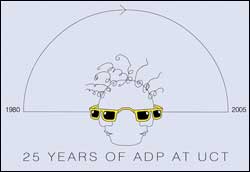Changing the mainstream
13 March 2006
The Academic Development Programme (ADP), now part of the Centre for Higher Education Development (CHED), marked its 25th birthday in November 2005.
From the late 1970s, liberal institutions like UCT used their creativity to advance black student enrolment in the face of apartheid policy. Permits to study certain subjects were manipulated and students discreetly transferred to other courses. The forerunner of the ADP, the Academic Support Programme, was set up in 1980 to find ways of increasing access for black students, enabling them to succeed in UCT's unfamiliar and often daunting academic culture.
Times have changed, but the ADP's raison d'être remains the same: promoting equity within UCT by providing developmental programmes for talented students from educationally disadvantaged backgrounds, and improving the capacity of mainstream programmes to cater effectively for student diversity.
Almost all the students who enter UCT via the ADP have not met the regular entry requirements.
The Alternative Admissions Research Project (AARP) plays a key role in identifying students who were unable to demonstrate their talents through the "traditional" education system. The Language Development Group, the Numeracy Centre and five faculty-based units set out to create an enabling environment in which students can realise their potential and succeed within even the most demanding university programmes.
The results show that it's working. For example, in recent years the majority of South African black graduates in engineering and science have come through ADP programmes.
But the nature and scope of its work has evolved as new opportunities and challenges come to light in the new political landscape.
Major inequalities still exist in the country and effective ways need to be found to unearth the talent that remains hidden in the rubble of past injustices.
The ADP has responded by broadening its agenda beyond UCT to look at inequality against a national backdrop.
ADP director Professor Ian Scott explains: "For me, transformation means changing who benefits from higher education. This applies to staff, the student body and the ways in which the country benefits from our graduates and our research."
Recently approved government funding shows that equity-related programmes like the ADP have become strategically important for the country's economic and social development, especially with the current skills shortage.
As student intake in education increases and its composition alters, Scott believes that the higher education sector needs to improve its ability to cater for diverse backgrounds and become more responsive to the different academic and social needs of students. An important element of this is rethinking the curriculum, teaching and delivery methods.
"But that's very difficult in a sector that is conservative and often resistant to change."
The small proportion of students graduating in regulation time is an indication that the current one-size-fits-all approach is not working.
"So why do we still treat it as the norm?" says Scott. "We need to look at the system as a whole and ask ourselves: what is the mainstream?"
CHED has been commissioned by the Council on Higher Education to research underlying factors contributing to poor performance in higher education. They hope to come up with evidence that will drive the sector to make some systemic changes.
And what is the next course in the ADP's journey for the next 25 years?
"Many people think equity related work will magically come to an end at some point, but the need for this kind of work will continue as long as there are substantial inequities in the society," Scott responds.
"I hope that in the next 25 years we will reach a more realistic notion of mainstream higher education, one that is much more flexible and able to cope with diversity as the norm."
 This work is licensed under a Creative Commons Attribution-NoDerivatives 4.0 International License.
This work is licensed under a Creative Commons Attribution-NoDerivatives 4.0 International License.
Please view the republishing articles page for more information.










